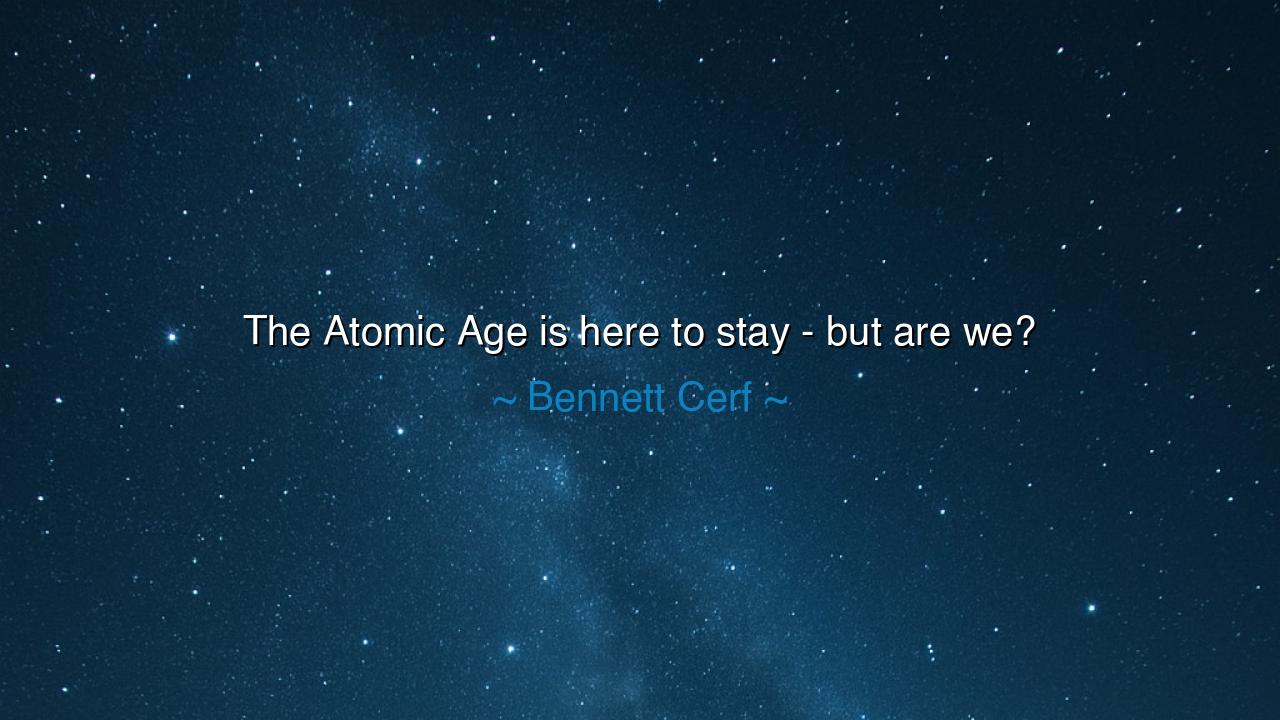
The Atomic Age is here to stay - but are we?






The wise publisher and wit Bennett Cerf, a man who balanced humor with foresight, once uttered a line that struck the world like a thunderclap of truth: “The Atomic Age is here to stay — but are we?” In this single question lies the trembling heart of the twentieth century — a cry of wonder and warning. It was spoken in the wake of humanity’s greatest triumph and its darkest revelation: that mankind had unlocked the power of the atom, the fire of creation itself, and yet stood trembling before the abyss of its own destruction. In Cerf’s voice we hear the awe of an age that had seen gods’ power descend into human hands — and the fear that the hands were not yet wise enough to hold it.
The origin of this quote lies in the aftermath of the Second World War, when the world entered what we now call the Atomic Age. Hiroshima and Nagasaki had burned beneath the new sun of man’s invention; cities were reduced to ash in the span of a heartbeat. Yet out of that horror came also a new dawn — the promise of boundless energy, the dream of science as savior. Cerf, who lived among the thinkers and artists of that era, saw both sides of this revelation. He recognized that humanity had crossed an irreversible threshold. The genie had escaped the bottle, and it would not return. The question was not whether atomic power would endure — it surely would — but whether human wisdom, morality, and restraint would endure alongside it.
In his statement, Cerf does not condemn science; he calls humanity to accountability. The atom was not evil — it was indifferent, as all of nature’s powers are. What mattered was the soul of the one who wielded it. The “Atomic Age” represents the mastery of knowledge; but the second half of his question — “But are we?” — challenges whether mankind has mastered itself. He understood that civilization’s survival would not depend on what we could build, but on what we could control within ourselves: our anger, our fear, our greed. For if man’s heart did not evolve as swiftly as his machines, the fire of creation would become the fire of ruin.
Consider the story of J. Robert Oppenheimer, the father of the atomic bomb. When he witnessed the first explosion at Los Alamos, he recalled the words of the Bhagavad Gita: “Now I am become Death, the destroyer of worlds.” His face, lit by that unearthly light, revealed not triumph but terror — for in that moment he realized that humanity had reached a godlike power without divine wisdom. He had built a weapon to end war, yet unleashed a force that might end all wars by ending all life. In his lifetime, he came to embody the paradox that Cerf warned of: the brilliance of mind without the balance of soul. The Atomic Age had arrived, but man’s moral age lagged far behind.
Cerf’s words, though born in the mid-century, speak now with even greater urgency. The “Atomic Age” has only grown — its children are the technologies that now shape every aspect of our lives: nuclear power, artificial intelligence, genetic engineering, and the unseen web of data that binds humanity together. Each carries within it the same double edge — the potential for creation and destruction, progress and peril. The tools evolve; the question remains the same. Are we wise enough to endure the power we have created? Are we fit to survive in the world we have built? These are not questions of science, but of conscience.
The meaning of Cerf’s quote, therefore, reaches beyond the age of atoms. It is a mirror held up to humanity’s eternal struggle between knowledge and wisdom. Every generation must ask itself whether its progress has outpaced its morality. For invention is meaningless if it destroys the inventor; discovery is hollow if it unravels the world that birthed it. To survive in the Atomic Age — or any age of power — we must learn restraint, empathy, and reverence. Without them, our achievements become monuments to our folly.
The lesson, then, is as old as it is urgent: power demands character. Each person, in their own sphere, holds a fragment of the atom’s fire — the power to create, to harm, to change the world around them. What Cerf warned of on a global scale begins in the heart of the individual. Rule your temper as you would rule a weapon; weigh your words as you would weigh the fate of nations. Cultivate humility before the mysteries of creation, for pride is the herald of ruin. Humanity’s survival will not be ensured by its brilliance, but by its wisdom, compassion, and self-restraint.
Thus remember, O inheritor of the modern world, that the Atomic Age is indeed here to stay — but the question remains forever in your hands. The atom, the machine, the algorithm — all are reflections of the soul that wields them. Choose wisely, and they become instruments of life. Choose recklessly, and they become heralds of death. The power that burns in the heart of the atom burns also in you. Nurture it with humility, and it will illuminate the world; misuse it, and it will consume all you love. The age is here to stay — but whether we are depends on what kind of beings we choose to become.






AAdministratorAdministrator
Welcome, honored guests. Please leave a comment, we will respond soon